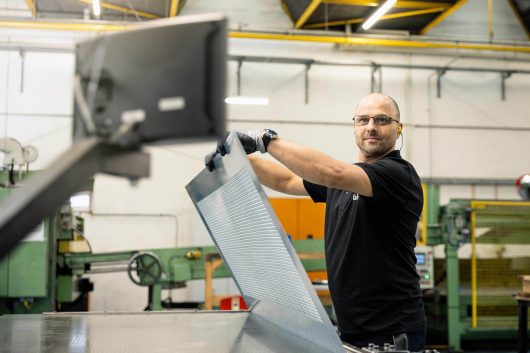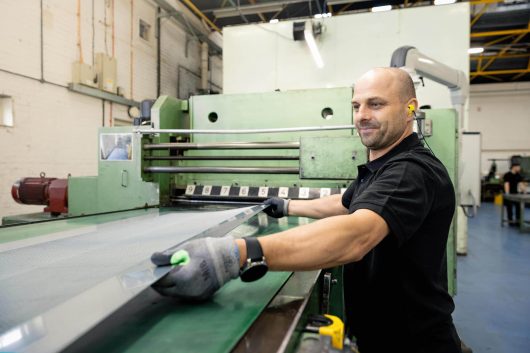Bion offer custom perforated stainless steel to customer requirements. Stainless steel is a high-strength, high-corrosion resistant group of steels containing a minimum of 10.5% chromium – this is what prevents the iron from rusting. Stainless steels are generally classified in four ‘families’: Austenitic, Ferritic, Martensitic and Duplex.

304 and 316 grades are the most common grades availablewith excellent corrosion resistance and strength. They are better suited for outdoor purposes or where some load strength is required. While slightly more expensive than 304, 316 does have a higher corrosion resistance so will last longer in harsher environments.
430 grade stainless is one of the cheapest available and still has similar corrosion resistance to that of 316 while having the added benefit of being much more accommodating during welding or forming processes.
S32750 is the most common Duplex we perforate (a Super Duplex grade). This grade is used primarily where high temperatures are involved due to the Austenitic grades’ susceptibility to stress corrosion cracking.
Austenitic stainless steels are the most common and can be further broken down into 200 series or 300 series groups, the 300 series being the more common of these two groups. Austenitic steels generally have a lower yield strength and cannot be heat treated due to their microstructure and chemical composition. Austenitic grades are generally not as well suited as Ferritic grades for high temperature environments but are not at risk of becoming brittle at lower temperatures.
Ferritic stainless steels again cannot be hardened by heat treatment due to the chromium content and due to the low nickel content and are cheaper than Austenitic grades. Ferritic stainless steels are also magnetic. This is the 400 series group and while they share a lot of the same properties, Ferritic grades cannot be work hardened as well or as quickly as Austenitic grades.

Martensitic stainless steels are also magnetic and are generally used in engineering, tool making and creep resistant applications. However, they lack the corrosion resistance of Ferritic or Austenitic stainless steels due to their lower chromium content.
Finally, Duplex stainless steels are a mixture of Austenitic and Ferritic stainless steels. These can be categorised furthered based on the corrosion resistance of that specific grade: Lean Duplex, Duplex and Super Duplex. Generally featuring a higher chromium and molybdenum content, Duplex grades have a much higher corrosion resistance and a much higher yield strength than Austenitic/Ferritic grades. They are also more favourable than Austenitic grades due to their resistance to stress corrosion cracking.
For all your bespoke perforated stainless steel requirements please contact our team today.